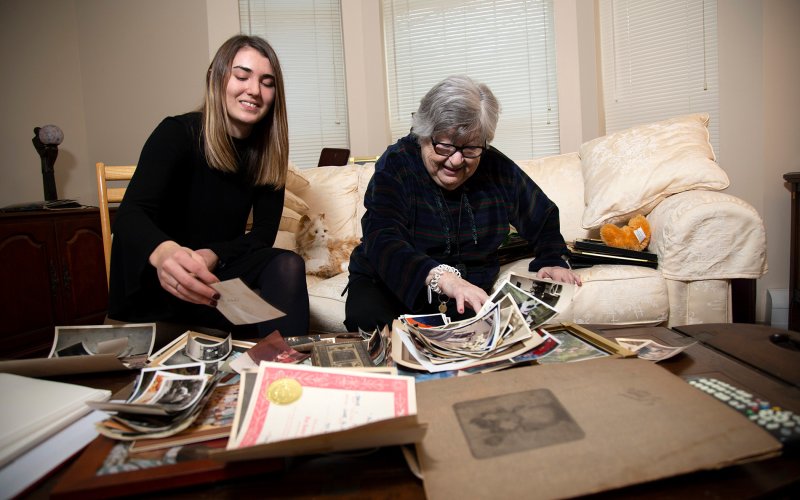Past, Present, and Future of Aging: A Celebration of IAP

Who is going to help me when I am older?
What do I want my second half of life to look like?
What makes life meaningful?
These are some of the tough questions that the Internships in Aging Project (IAP) students face as they learn about social work practice with older people. Students who are in their 20’s and 30’s may not have spent a lot of time thinking about getting older, or when they do, they come against ageist stereotypes that portray getting older as only about loss. But these students are learning that our increased life spans and different living patterns are creating opportunities for social workers to make getting older a time of growth and fulfillment. Through a robust curriculum and internships in a range of community agencies, students gain skills to meet the needs of older people and their families. They also consider future planning and what services they might want when they are older.
In the twenty-three years since it started, IAP has worked with a range of community partners – health systems, substance abuse, mental health programs, community organizations, and state offices. There are around 275 IAP alumni in the Capital Region, across the US and in other countries like South Korea and Mongolia.
What do these alumni have to say about the program?
Natalie Turner, ’18 says,
“I work in the healthcare field, so of course we are seeing more (older) people come through hospitals and clinics. But even social workers working with families, substance abuse, mental health... [all see] older adults facing these issues. The IAP seminars that I attended brought in different professionals. We got to see different organizations and visit them, see where people work, and what work looks like in a macro setting such as the Office of the Aging versus a clinic like mine, a community non-for-profit. We got to see all of them, see all of the needs and the opportunity to work in the aging field. It’s really critically important to have more social workers involved. It is going to become more and more relevant as time goes on.”
To hear more from Natalie about her experience in IAP, listen to a clip from The Social Workers Radio show.
Maria Mursh, '12 adds,
“IAP was one of the best experiences I had. The scholarship and the care among my colleagues really got me through the program and opened my eyes to the needs of older adults. And it is so gratifying to be able to serve them.”
Tianna, ’01 – part of the first cohort of IAP students – now works in NY State service. She reflects on her history with IAP.
“The ongoing, almost 20-year relationship with the IAP program following my graduation, has provided me with mentorship, continued learning and growth. My first experiences in interviewing job candidates came through IAP, interviewing prospective IAP students… I now regularly shape and conduct interviews. My first experiences in supervision came through supervising IAP students as a field instructor for the program… and I now supervise a team which includes staff who supervise other staff. In short, IAP shaped me as a leader in the field of aging, both as a student and as an alum… my IAP experience did not end when I graduated, IAP helped me grow into my current leadership role.”
The School of Social Welfare will be highlighting the Internships in Aging Project (IAP) on Thursday, April 20th at its “Celebration of the Past, Present, and Future” event. This event is free and open to the SSW community.
For more information about participating in the Internships in Aging Project, contact Linda Mertz.


